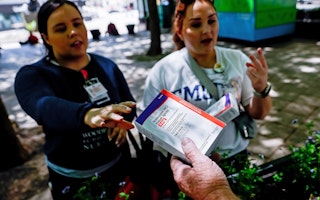Can Police Help End the War on Drugs?
By Karolina Walecik
When police in the German city of Frankfurt surveyed the drug scene 20 years ago, they knew they needed help.
Every day, more than 1,000 people gathered in a public park in the city’s central business district to use drugs. Deaths related to drug use spiked from 31 in 1985 to 147 in 1991. Law enforcement recognized that arrests and prosecutions weren’t working.
Peter Frerichs, former head of the Frankfurt police, recalls, “We had to accept that the police did not have the means to get this disease under control. We took the view that these people did not belong in a police cell, but had to be taken care of by social services.”
The resulting policy, which entailed a collaborative effort of agencies with a stake in drugs, became known as The Frankfurt Way. While it may surprise some that police took a leading role in a partnership with drug services, health administrators, and media, Frerichs said, “We—the police and the Department of Public Prosecution—felt compelled to jointly attempt to keep these people, as much as possible out of criminalization, referring them to the helping services instead.”
And it worked.
The actions initiated from 1992 onwards resulted in a decline of drug-related deaths—from 147 in 1991 to the low 20s in recent years—as well as a steep drop in criminality.
Frankfurt is not the only city to engage police in changing the approach to drugs. Many cities in the United States, Brazil, and Europe have tried alternative forms of policing. Last month, 50 law enforcement officials from around the world gathered in Frankfurt to share best practices in policing and to consider whether examples such as the Frankfurt Way are applicable to their own jurisdictions.
Funded by the Open Society Foundations, with additional support by the Frankfurt Police Department and Frankfurt Municipal Drug Policy Coordination Office, the conversations were clear that there is no one-size-fits-all approach.
The lessons shared by participants of the International Conference on Drug Policy and Policing spanned from Portugal, where personal use and possession of all drugs was decriminalized in 2001, to Rio de Janeiro, where police realized that heavy repression lead to the escalation of violence and victimization of civilians.
“You don’t have to make the leap from complete zero-tolerance approach to full decriminalization. There is always something you can do better, regardless of local laws that you may think are constraining you,” said one of the participants encouraging colleagues to think about local circumstances and most effective ways of responding to drug law enforcement.
Based on the two-day discussions, a document called "The Frankfurt Principles" was adopted at the closing session. It’s a list of action points intended to serve as guiding principles for police drug law enforcement practice. They include a call for collaborative and cooperative approaches that could truly benefit public safety, use of police discretion to prioritize enforcement on violence and criminal enterprise rather than on low-level drug users, or balanced strategies to minimize harm to individuals and society.
We believe that one of the most important tests for effective drug policies is how drug law and policy reform translate into police practice on the ground. Inviting law enforcement representatives to the policy table to share their perspective may help clarify barriers to and opportunities for changing police practice. The conference showed that there is need for experience exchange and peer learning among police.
Until August 2014, Karolina Walecik was a program officer with the Open Society Global Drug Policy Program.


